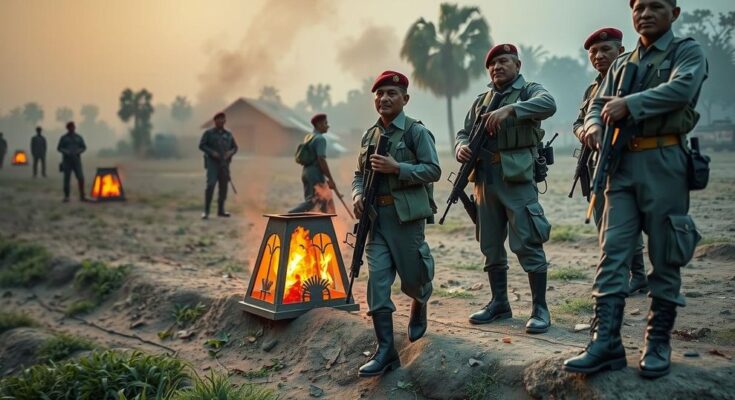The Arakan Army’s rise amidst Myanmar’s civil war raises security concerns for India and Bangladesh, particularly regarding potential refugee crises. This situation is exacerbated by the historical context of the Rohingya conflict and ongoing geopolitical tensions involving China. India’s response includes strict border regulations and renewed diplomatic engagement with both the military junta and ethnic armed groups to secure its interests in the region.
The ongoing civil war in Myanmar, intensified since the military coup in 2021, has seen the Arakan Army assert considerable control over the Rakhine province. This shift in power has led to rising fears of a humanitarian crisis along the Myanmar-Bangladesh border, especially regarding a potential influx of Rohingya refugees. Amid global distractions from Myanmar’s turmoil, India’s interest in the evolving conflict is significant due to implications for regional security and direct impacts on India’s northeastern states.
The Arakan Army, part of the Three Brotherhood Alliance, has achieved notable victories against the military junta, including seizing the town of Lashio in 2023. This alliance poses a unique challenge as it expands its influence and possibly starts exerting control over areas within Bangladesh, risking escalated conflict with the Bangladesh Army. Historically, the Arakan Army has been accused of committing atrocities against the Rohingya, whom the Myanmar government does not recognize as citizens. Sripathi Narayanan, a foreign policy analyst, notes, “The Rohingya have been used as cannon fodder by both the junta and the rebels.”
India’s response to the situation has been cautious yet proactive. Fears surrounding the proliferation of advanced weaponry to Indian insurgent groups and increased drug trafficking have prompted India to tighten border regulations. Additionally, India’s own tensions in states like Manipur compound the need for a strategic approach to the conflict in Myanmar. Observers note a recurring theme of regional dynamics where nations are increasingly turning to China, potentially undermining Indian interests.
China’s deep investments in Myanmar, particularly in infrastructure and energy, complicate India’s position. The Arakan Army’s growing power is strategically significant for Beijing as it observes India’s Kaladan project intended to enhance connectivity to its northeastern region. The stalled Kaladan project and its potential to augment India’s economic footprint in Myanmar make collaboration with the Arakan Army necessary, as emphasized by Cchavi Vasisht from Chintan Research Foundation, stating that India has begun engagement with these ethnic armed organizations to protect its interests.
The conflict in Myanmar arose from the military coup in 2021 that removed a democratically elected government. Ethnic armed organizations, such as the Arakan Army, have long sought greater autonomy and control over local resources, escalating their clashes with the military. As these groups gain ground, they impact the balance of power in the region, affecting neighboring countries like Bangladesh and India. The historical context of the Rohingya crisis, stemming from severe military crackdowns, feeds into the current humanitarian concerns and influences regional security dynamics.
The situation in Myanmar continues to pose significant challenges for regional stability, particularly for India. The rise of the Arakan Army indicates a shift in control that may lead to new humanitarian crises while exacerbating existing tensions in the region. India’s mixed engagement strategy seeks to balance its security interests with humanitarian concerns, necessitating a comprehensive dialogue involving all stakeholders for a peaceful resolution.
Original Source: www.ndtv.com




